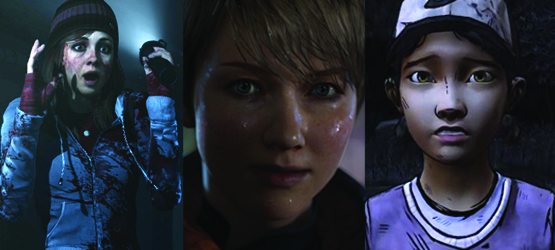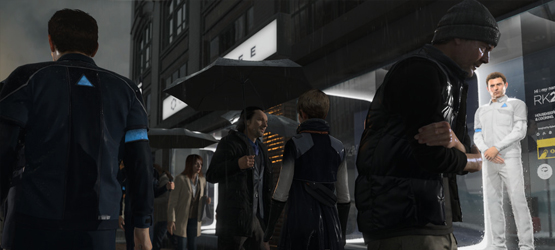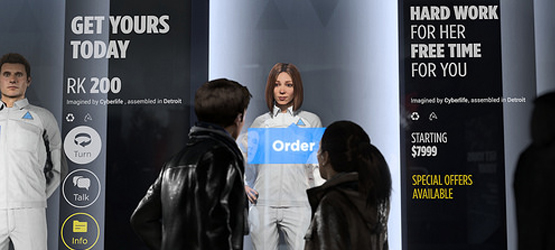Before the curtain fell on Sony’s Paris Games Week showcase last month, the platform holder squeezed in just one more announcement that was unsurprising yet brilliant — unique, yet oddly familiar. Yes, reaping the benefits of being on home turf, French studio Quantic Dream formally unveiled Detroit: Become Human, its brand new IP and PlayStation 4 debut.
Long-rumored to be titled Singularity, the developer’s latest is an evolution of its PS3 tech demo Kara from 2012, which piqued the attention of many a gamer regardless of whether they were fond of Quantic’s previous work or not.
I, Robot
The elevator pitch? Building on the existential themes laid out in the demo, Kara (Twilight alum Valorie Curry) begins to sense fleeting signs of consciousness after being constructed in a near-future factory. Toeing the line that divides man and machine, our android lead is then exposed to the titular Michigan city, and the relationship between humans and their cybernetic counterparts is a far cry from what she envisioned. Okay, let’s just say it was a longer-than-average elevator ride.
Nonetheless, even since the release of Beyond: Two Souls only two years ago, the landscape for interactive drama and narrative-driven games has changed quite dramatically. Not only has Dontnod and Supermassive entered the fray with Life is Strange and the really rather excellent Until Dawn, respectively, but Telltale Games continues to hoover up seemingly every IP under the sun to fit its overly successful story first, gameplay second design template.
Perhaps out of the three, it’s Until Dawn that bears semblance to Quantic Dream’s formula the most in that, at a structural level, Supermassive’s slasher tribute takes the concept of an interactive movie and strengthens it with strong gameplay mechanics and a gripping cause-and-effect principle. Indeed such was the success of the studio’s new IP that Sony is keen to nurture the Until Dawn brand henceforth, as evidenced by the Rush of Blood standalone for PlayStation VR and hushed talk of a direct, possibly anthology-styled sequel.
So where does this leave Quantic Dream and Detroit: Become Human? Granted, it’s not a direct apples-to-apples comparison; similarly to delving into the minutia by equating Tekken to, say, the Street Fighter series. But coming off the back of underwhelming Beyond: Two Souls, it’s evident that the French story maestros have to up their game.
Your Move, Quantic
Across a trio of story-driven titles on PlayStation platforms, Quantic has grown into one of the more divisive studios — and indeed auteurs — in the entire industry, and Two Souls was really emblematic of that conundrum: no matter how ambitious, the execution never quite met the vision for one reason or another.
Flawed, heavy-handed storytelling and gaping plot holes are common criticisms levelled at the developer, and all of these point to narratives that ultimately overreach the boundaries of the medium.
Based on a fleeting first impression, it’s impossible to draw any conclusive evidence based on Detroit: Become Human’s show-stopping trailer. What we do know is that the footage showcased at Paris Games Week was all captured in-engine, and the nuanced facial expressions of Kara are truly something to behold.
Even still, remember how excited everyone was upon the reveal of Beyond: Two Souls at E3 2012? Cinematic in every sense, the teaser set up the story for one Jodie Holmes as a true iteration of the much better PS3 exclusive Heavy Rain. Heck, buoyed by the star power of Ellen Page and Willem Dafoe, David Cage enlisted the interactive drama for an appearance at 2013’s Tribeca Film Festival.
While the cinematic tendencies remain a fixture of Detroit, Quantic is distancing itself from the celebrity-laden Two Souls — and indeed the human race entirely — to focus on artificial intelligence. Gunning for a cerebral sci-fi tale of what it means to be human, our first look at the studio’s new IP read like an unofficial sequel to Ex Machina which, for those of you who have seen Alex Garland’s excellent drama, is very high praise indeed.
Here, David Cage offers his take on the nuanced storytelling we can (hopefully) expect in Detroit: Become Human.
We didn’t want to do another story on AI (there are already so many great ones), we wanted to talk about what it means to be human and what it would be like to be in the shoes of an android discovering our world and their own emotion.
Kara represents a blank canvas, then; an untainted soul stumbling into our world that soon unearths the crippling automatonophobia that relegates her kind to little more than practical tools. From the anti-android rally to the segregated public transport routes, there’s a palpable unrest brewing on the streets of Detroit, and though Kara is a sentient, highly-intelligent being, her existence is predicated on the binary viewpoint that divides man and machine.
Superintelligence
There’s also the parallel to Detroit’s history as a pioneer with heavy industry. By the turn of the 20th century, the Michigan city had established its reputation as one of the country’s more prominent hubs of industrial activity, seeding the nickname of the Motor City during the throes of World War I. For Quantic Dream’s latest, the French dev will be extracting that rich and storied history and imagining a future in which Detroit maintains that pioneering spirit — only this time for artificial intelligence.
On paper, it’s brimming with potential, but Quantic’s new kid on the block is entering a more crowded genre than its spiritual predecessor. From the aforementioned Until Dawn to Telltale’s cavalcade of story-driven series, players have been exposed to a burgeoning number of interactive dramas in recent years, and you know what they say about competition benefiting the entire industry.
One common — and arguably well-held — complaint levelled at David Cage is that the esteemed director is a failed auteur. Despite layering his stories with numerous branching paths, peel back the illusion of choice and you’ll soon find that player agency is surprisingly limited. Will Detroit be different?
Before she was showcased to the world, Kara was initially designed to be nothing more than a tech demo — how very apropos — but Cage’s tale is clearly one that has grown in the telling. Details are still thin on the ground when it comes to Detroit: Become Human, but given Quantic’s M.O. we can surely expect a shower scene and more morally ambitious decisions than you can shake a DualShock 4 at.
It’ll launch exclusively for PlayStation 4, likely at the tail-end of 2016 or, in the more likely scenario, early 2017.
Now Loading...Detroit
-
Now Loading...Detroit

-
Alex Co
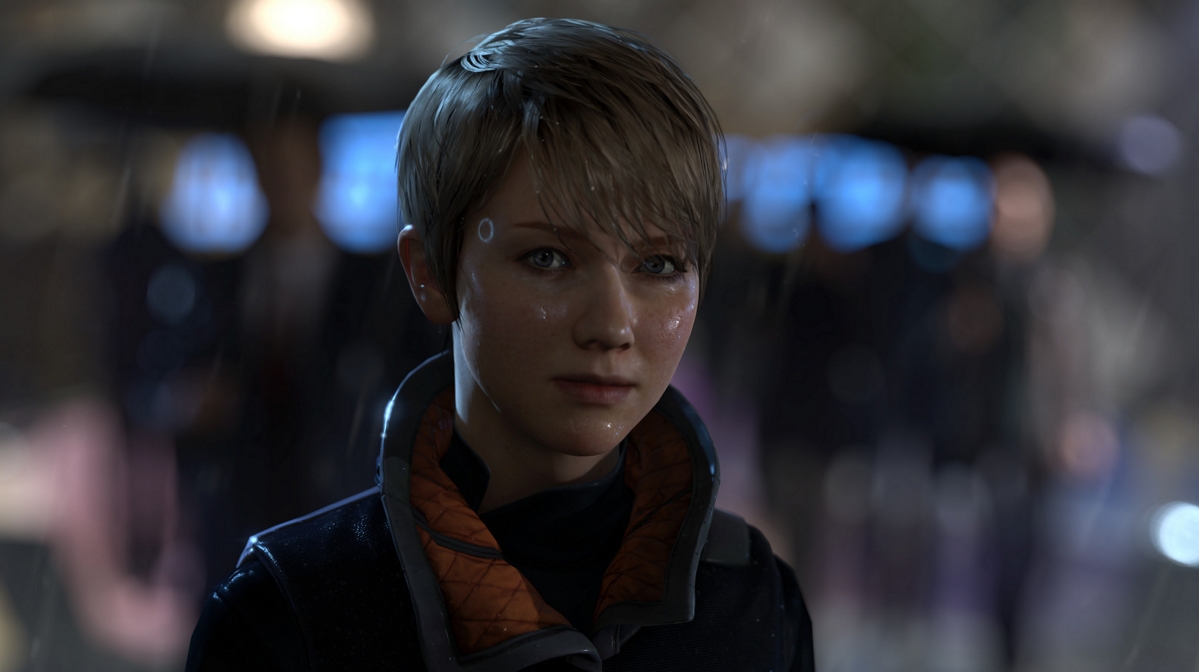
While the announcement itself was expected (Quantic announcing a game and not Detroit itself), the fact that it was from the studio's tech demo years ago is what made it more surprising.
I'm in the camp that loves Quantic Dream's games, so yeah, I'm definitely looking forward to Detroit.
Do I think it will have the same gameplay as Beyond and Heavy Rain? Yep. Am I OK with that? Very. I understand that some people aren't fan of games like this and Until Dawn, but for me? It's a very welcome change of pace from the multitudes of shooters, brawlers, action games out there right now.
Bring it on, Quantic!
-
Ben Tarrant
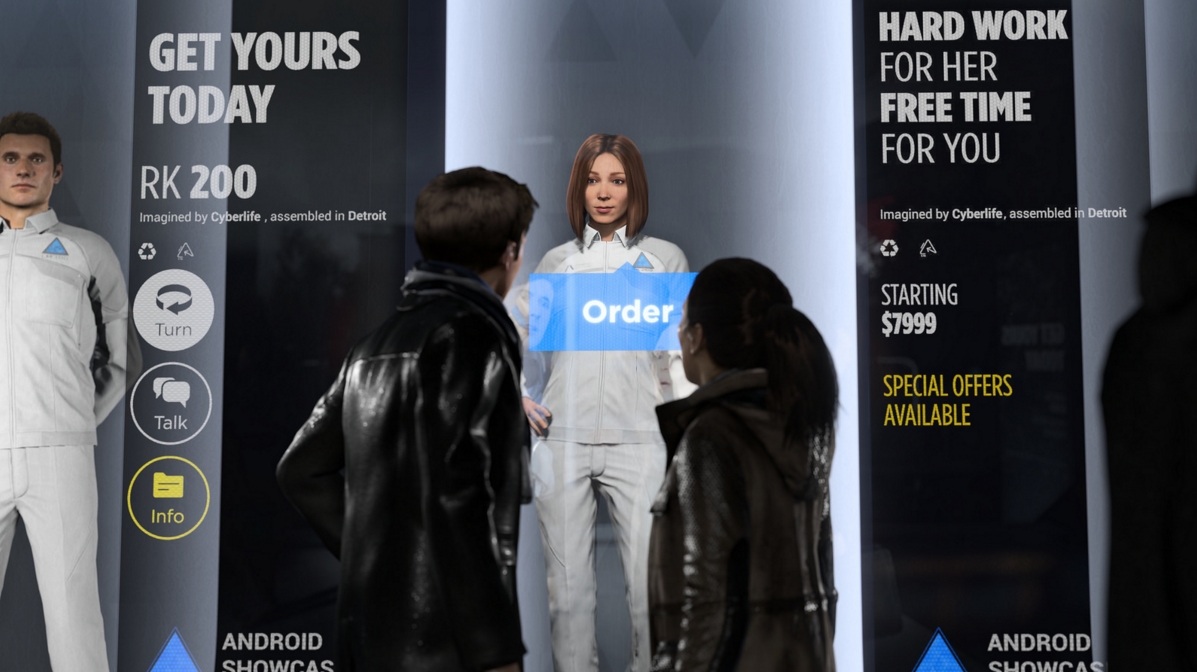
I think it's testament to how ridiculous Cage has got. I personally think it's a rather unimaginative idea. My fears are that the story will be weak and generic and won't be able to keep up with the typically sunning visuals.
We know Cage can do better.
Plus, when you announce it. Be clear on what you're planning to call it, yeah? C'mon. -
Cameron Teague

I honestly cannot wait for this game to be released. It has a sort of I Robot feel to it and I loved every second of the trailer. I personally didn't care for Heavy Rain but Beyond: Two Souls was an amazing success in my eyes, so I can't wait to see what they do with Detroit.
-
Chandler Wood

I'm with Ben on this. At least on the surface, it feels like a it will just be another story a thousand times told. We play as Kara discovering what it means to be human? I feel like it will be really hard to relate to her plight as a player that is already human. If we're going to be given moral choices to make, it makes little sense to have a human with a moral compass making decisions for an android that has yet to fully discover what it means to be human. I'll probably buy it and play it, but I'm still a fan of the dark crime and mystery narrative of Heavy Rain more than these new full life experience style stories that David Cage seems to be attending towards.
We've only seen one trailer though, and have next to no information on it, so I could be completely off base on my assumptions of what the game will be.
-
Heath Hindman

I just hope there's a reference to The Russian Five at some point.
-
Mack Ashworth
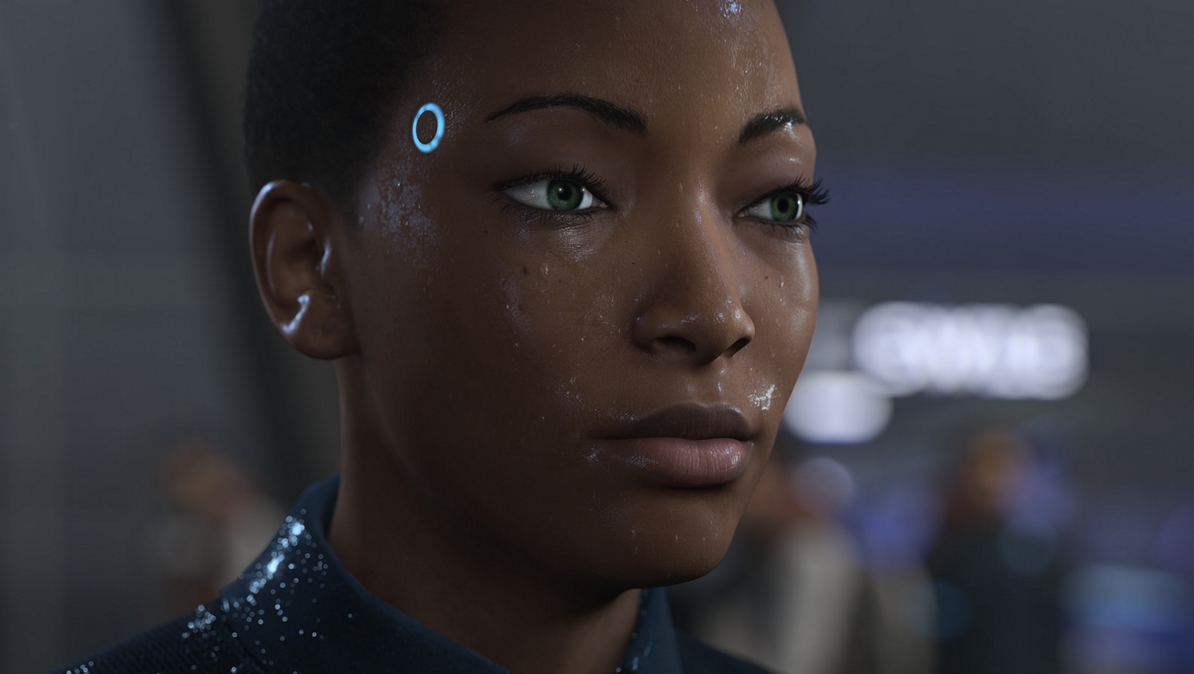
I'm willing to give Detroit a shot, as I've never actually played a Quantic Dream game before. I think the theme, while definitely not original, isn't too exhausted.
I look forward to seeing Detroit's spin on things!
-
Michael Briers
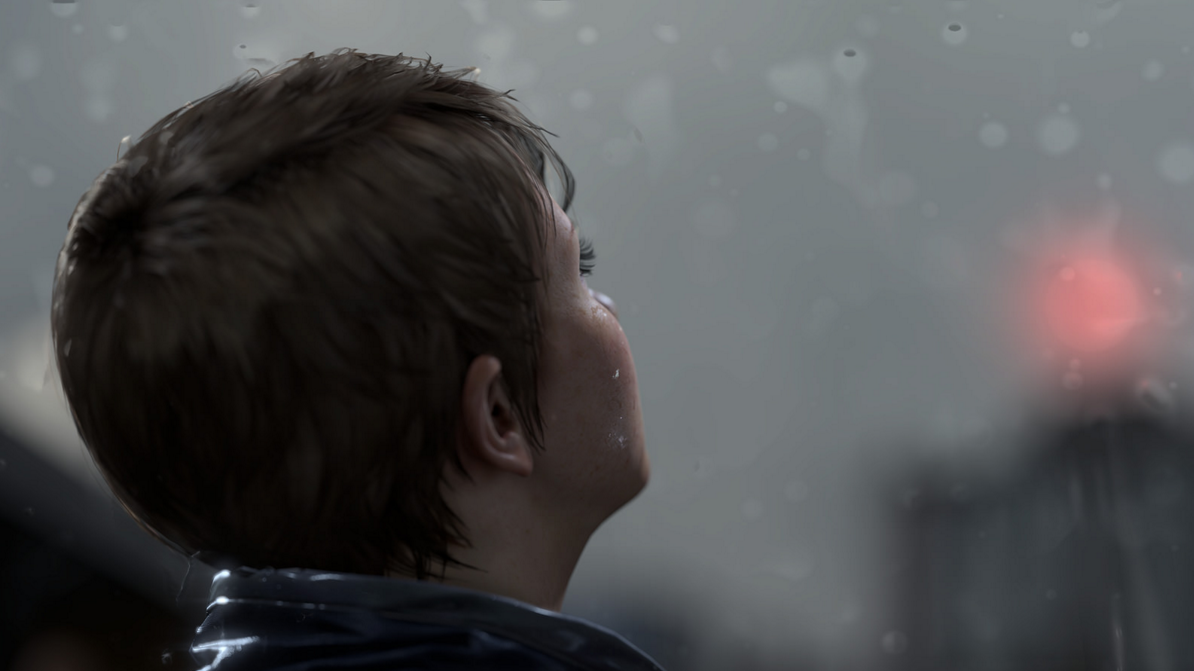
Impressed, surprisingly! I've only dabbled with Heavy Rain and Beyond: Two Souls -- Fahrenheit on PS2 was a personal favorite -- but the trailer and general concept for Detroit hooked me, even if the name is a little silly. It's like the sequel to Alex Garland's Ex Machina that I never thought I wanted, and the idea of a sentient AI stumbling into the real world is fertile ground for storytelling, so long as it sidesteps the uneven pacing and flawed control scheme of Two Souls.
-
Stephen Bitto
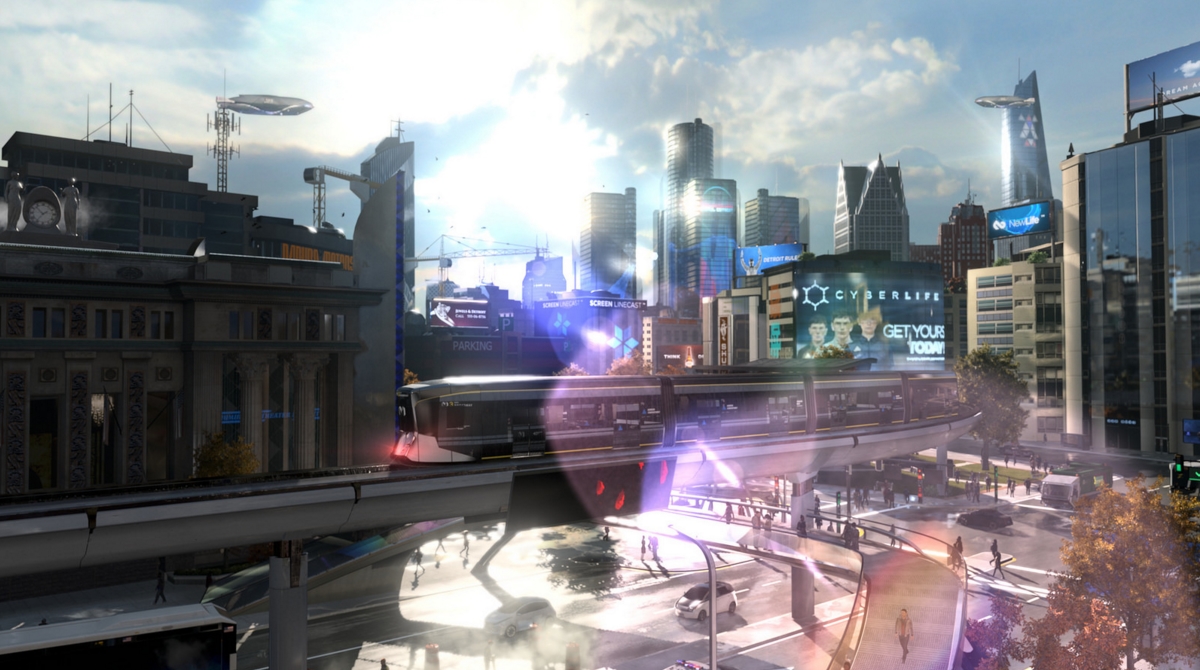
Heavy Rain was one of my favorite games on PlayStation 3 but I found Beyond: Two Souls underwhelming when I played it recently. When it comes to Detroit: Become Human, I am tempering my excitement until I see the game being played. While I've never doubted Quantic Dream's ability to nail presentation, their gameplay and storytelling took a big step backward with Beyond. I hope to be pleasantly surprised whenever I finally get get my hands on Detroit.
-
Zarmena Khan
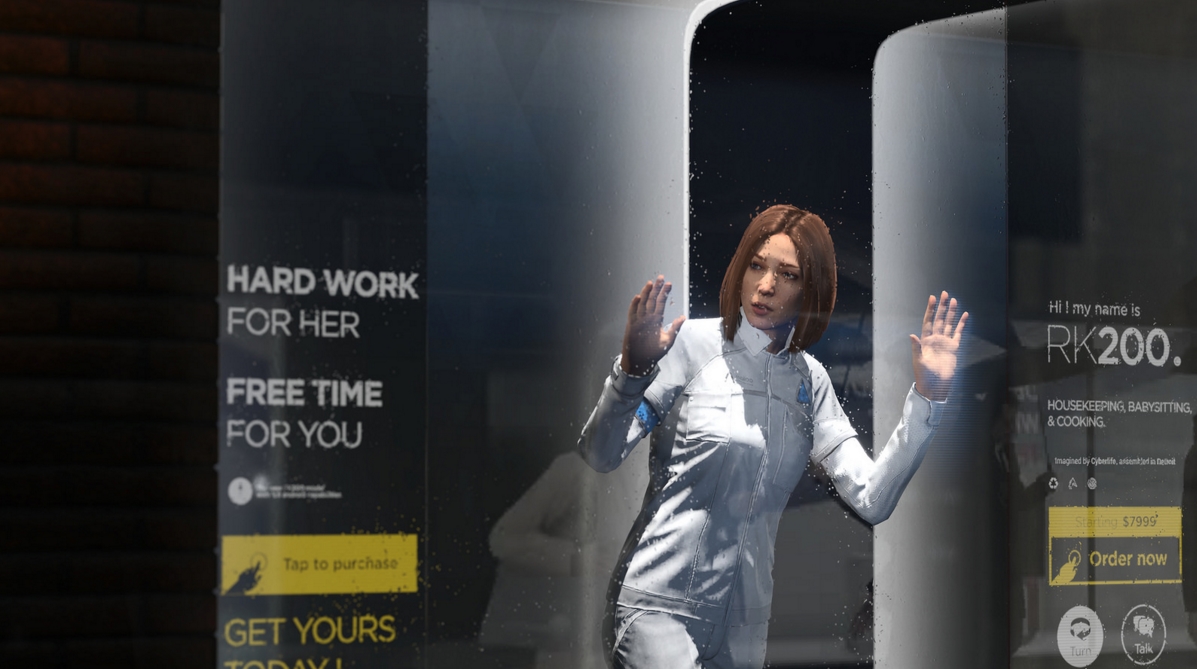
I know some folks think David Cage's work is terrible, but personally, I thoroughly enjoyed Heavy Rain and Beyond: Two Souls' storytelling. I can't wait for Detroit. I have a feeling I'll love this one, too.
